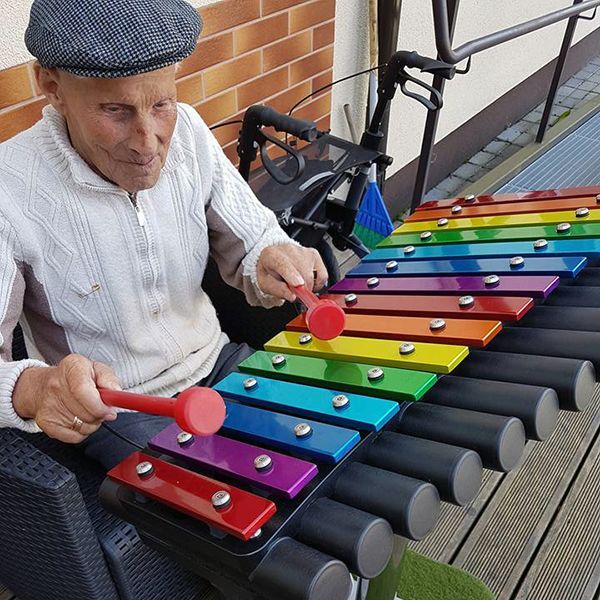
Let's Jam
Simply enter your name, email address, and click subscribe to get the latest product updates.
By clicking "Subscribe", you confirm that you have read and accepted our Terms and Conditions, Privacy Policy and Cookie Policy.
Every year, April is celebrated as World Autism Month, beginning with the United Nations' World Autism Awareness Day on April 2. This year marks the 17th anniversary of this special day. Its purpose is to raise awareness, increase understanding, and promote acceptance of individuals with Autism. The ultimate goal is to create a world where autistic individuals are fully supported, valued, and celebrated, and we must all work together to achieve this. Today, we want to take this opportunity to discuss the benefits of music and music-making for children and adults with Autism.
Music therapy is a form of holistic healing that benefits people in various ways. It can help with cognitive, emotional, social, and physical needs. Many studies have shown that music therapy can alleviate symptoms and provide inner calm to people. As a result, it has become increasingly popular, especially for children and adults with Autism.
Research has demonstrated that playing musical instruments and participating in music therapy can significantly enhance communication skills in individuals with Autism. Engaging in outdoor musical activities has also been shown to provide numerous benefits, such as developing connections with other players and promoting better overall communication.
Autism is a condition characterized by a specific set of behaviors and is considered a 'spectrum disorder,' meaning it affects individuals differently and to varying degrees. It can cause challenges in the development of social, verbal, and cognitive abilities, which may make it difficult for someone with Autism to communicate with others. It's important to note that Autism is not an illness or a medical condition but rather a developmental disability that presents significant social, behavioral, and communication challenges. In recent years, Autism has also been recognized as an example of neurodiversity.
The number of individuals diagnosed with Autism has significantly increased over the years. Currently, it is estimated that one in sixty-eight Americans and one in one hundred people in the UK are identified as being on the autistic spectrum. Autism not only affects the lives of those who have the condition but also has an impact on their families. Considering these figures, it means that Autism is a part of the daily life of over 4 million people in the United States alone, and many more individuals remain undiagnosed.
Music can be highly beneficial for individuals with Autism. It's been found that music stimulates both hemispheres of the brain, which makes it an effective tool in therapeutic contexts. Studies have shown that music education and therapy can improve cognitive function and language development from an early age.
Music can be an effective tool for individuals with Autism who have difficulty communicating and interacting socially with others. Music therapy can help with processing and communicating emotions and states of mind, which are often challenging for people with Autism. Listening and creating music and rhythmic patterns can improve attention, a critical aspect of sensory integration. Rhythmic music therapy can help individuals with Autism develop better attention spans, social integration and participation, speech and language, and emotional self-regulation.
Children with Autism often face significant challenges when it comes to social interaction. However, music can help encourage them to engage in reciprocal communicative behavior, empowering them to understand, manage, and overcome these difficulties. By introducing musical instruments into their environment, children with Autism can initially connect with the instrument in a non-threatening and non-pressurized way. This creates an organic process of communication that helps them open up to others who are also interacting with the instruments. Music is an excellent tool for engaging children with Autism, as it can capture and maintain their attention in ways other mediums may not. Playing musical instruments can help these children navigate social situations more easily, alleviate negative emotions and distress reactions, and reinforce desired responses.
Percussion Play's outdoor musical instruments are designed for inclusivity and accessibility, perfect for enhancing gardens and communal areas in various settings like schools, care homes, and hospitals. These instruments blend the benefits of outdoor exposure with musical play and therapy, fostering learning, communication, and socialization. Among these, the Duo outdoor xylophone stands out for its unique design tailored to individuals with autistic spectrum disorders, enabling joyful and connective engagement without direct eye contact. This metallophone, playable by up to four individuals, features a curved design that facilitates comfortable, shared musical experiences without the stress of eye contact, catering to those who find this aspect challenging.
To gain a deeper understanding of the topic, we'd like to invite you to read our White Paper titled Sounds and the Spectrum: The Benefits of Music for People with Autism Spectrum Disorders. The paper delves into how outdoor musical instruments can significantly impact social interaction, especially for individuals on the autism spectrum who might face difficulties in conventional forms of social interaction. We highlight how musical instruments enable communication without requiring close physical proximity, acting as a universal language that overcomes barriers and promotes inclusivity. The paper acknowledges the crucial role that music and sound play in creating a more connected world.